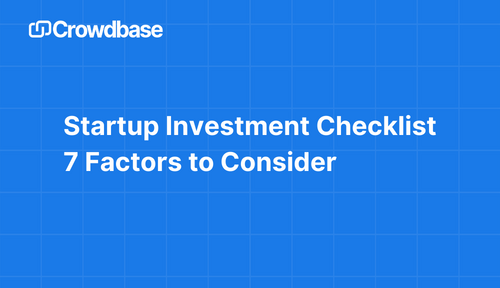Startup Investment Checklist: 7 Factors to Consider

Frixos Larkos
Co-Founder & CEO

Are you considering investing in a startup? Investing can be an exciting and rewarding experience, but it’s important to do your research before committing. It’s essential to understand the risks involved, as well as know certain factors that can help increase your chances of success in the long run.
In this blog post, we'll discuss several practical guidelines every investor should follow before taking part in a startup investment venture. So, let's dive right into what matters most when it comes to investing in a startup!
Strong and Experienced Team
Perhaps the most important factor when considering an investment in an early venture is the team behind it. It's important to make sure that each team member has relevant industry experience as well as a successful track record.
Having an experienced and competent team in place makes the startup more likely to achieve its goals, and gives investors greater confidence in their investments. Ultimately, this can make the difference between a profitable venture and one that fails to get off the ground.
Market Potential
Making sure the company is addressing a significant market opportunity with potential for growth is essential for success. Ideally, you want the startup to be operating as part of a much larger target market, with the market itself growing over time. In this way, the startup has a big room for improvement in terms of increasing its market share, which translates into potentially outsized returns for early backers.
Doing detailed market research and gathering insights into the target customer base and its needs should be an important part of the business plan development process. Through this approach, investors can confidently partner with startups and drive them toward realising their potential.
Transparency and Communication
It's crucial for companies to be honest about their financials and business operations so that investors can accurately assess the risks involved. At Crowdbase, we consider this an essential part of our review process before featuring any project on our platform. Additionally, startups should prioritise regular communication with investors, keeping them informed of any significant developments or changes that may affect their investments.
In the Key Investor Information Sheet (KIIS) of every campaign—which is a legally binding document—you can find details on how often the company has agreed to communicate with investors, under the Investor Rights section. Typically, companies raising capital with Crowdbase commit to providing updates to investors on at least a quarterly basis.
By being honest and transparent, companies not only build trust with their investors but also allow them to make informed decisions. Engaging in open dialogue helps create a healthy relationship between startups and investors, benefiting everyone involved.
Viable Business Model
Ensure that the startup has a viable and properly planned business model that can generate revenue, as well as be able to sustain its growth over time with appropriate scaling of resources.
Without this, the investment may become a costly and painful exercise. Good research before committing to an investment can help you make an informed decision, increasing your chances of reaping the rewards in the long run.
Competitive Advantage
A startup with a unique selling point or competitive advantage can make all the difference. It must be able to create a foundation and space for itself within its industry in order to have any chance at success.
This could range from providing an affordable luxury product that appeals to budget-conscious customers, or introducing a new technology into an existing landscape of products and services. Investing in a business that has a defined competitive edge over its competitors is likely to yield greater returns than one that lacks this factor.
Scalability
A business model must have the potential to grow and expand over time, allowing the company to reach more customers or create new sources of revenue. A scalable business model typically involves the use of technology and automation, with processes in place that prioritise efficiency and cost reduction.
Startups that show the ability to scale up operations are great candidates for successful investments in the long run. Make sure you review the potential for scalability before investing in any particular startup.
Traction
Looking for proof of traction in the market is an essential step of the investment process, as it can provide valuable insights into a startup’s potential for success. Evidence of traction can include things such as a steadily increasing customer base, high ratings or positive reviews, or even the presence of competitive products.
A startup that can demonstrate traction from early on would be better positioned for success than an otherwise identical startup with no traction.
Conclusion
Investing in a startup requires research and due diligence to ensure that it is the right opportunity for you. Consider the strength of the team behind the startup, the scalability of their product, the size of their potential market, and other elements like evidence of traction and their competitive advantage. Ensure that there is a high probability of success by carefully weighing all available information before investing.
However, it’s also important not to let fear paralyze you - being opportunistic can be key to a successful investor journey, and often sudden opportunities can prove to be some of the most profitable ones. With an open mind and a proper understanding of the industry as well as the risks and rewards of the investment opportunity, investing in a startup can be a truly rewarding experience.
More from Crowdbase
Discover more from our blog, guides and moreDon't miss the next opportunity
Sign up for our newsletter to be the first to know about new campaigns, updates and more!





